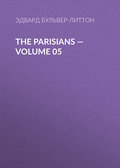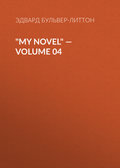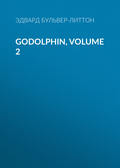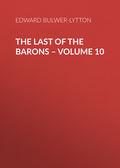
Эдвард Бульвер-Литтон
The Haunted and the Haunters; Or, The House and the Brain
We were in the hall, the street-door closed, and my attention was now drawn to my dog. He had at first run in eagerly enough, but had sneaked back to the door, and was scratching and whining to get out. After patting him on the head, and encouraging him gently, the dog seemed to reconcile himself to the situation, and followed me and F– through the house, but keeping close at my heels instead of hurrying inquisitively in advance, which was his usual and normal habit in all strange places. We first visited the subterranean apartments,—the kitchen and other offices, and especially the cellars, in which last there were two or three bottles of wine still left in a bin, covered with cobwebs, and evidently, by their appearance, undisturbed for many years. It was clear that the ghosts were not winebibbers. For the rest we discovered nothing of interest. There was a gloomy little backyard, with very high walls. The stones of this yard were very damp; and what with the damp, and what with the dust and smoke-grime on the pavement, our feet left a slight impression where we passed. And now appeared the first strange phenomenon witnessed by myself in this strange abode. I saw, just before me, the print of a foot suddenly form itself, as it were. I stopped, caught hold of my servant, and pointed to it. In advance of that footprint as suddenly dropped another. We both saw it. I advanced quickly to the place; the footprint kept advancing before me, a small footprint,—the foot of a child: the impression was too faint thoroughly to distinguish the shape, but it seemed to us both that it was the print of a naked foot. This phenomenon ceased when we arrived at the opposite wall, nor did it repeat itself on returning. We remounted the stairs, and entered the rooms on the ground-floor, a dining parlor, a small back-parlor, and a still smaller third room that had been probably appropriated to a footman,—all still as death. We then visited the drawing-rooms, which seemed fresh and new. In the front room I seated myself in an arm-chair. F– placed on the table the candlestick with which he had lighted us. I told him to shut the door. As he turned to do so a chair opposite to me moved from the wall quickly and noiselessly, and dropped itself about a yard from my own chair, immediately fronting it.
"Why, this is better than the turning-tables," said I, with a half-laugh; and as I laughed, my dog put back his head and howled.
F–, coming back, had not observed the movement of the chair. He employed himself now in stilling the dog. I continued to gaze on the chair, and fancied I saw on it a pale, blue, misty outline of a human figure, but an outline so indistinct that I could only distrust my own vision. The dog now was quiet.
"Put back that chair opposite to me," said I to F–; "put it back to the wall."
F– obeyed. "Was that you, sir?" said he, turning abruptly.
"I!—what?"
"Why, something struck me. I felt it sharply on the shoulder,—just here."
"No," said I. "But we have jugglers present, and though we may not discover their tricks, we shall catch them before they frighten us."
We did not stay long in the drawing-rooms,—in fact, they felt so damp and so chilly that I was glad to get to the fire upstairs. We locked the doors of the drawing-rooms,—a precaution which, I should observe, we had taken with all the rooms we had searched below. The bedroom my servant had selected for me was the best on the floor,—a large one, with two windows fronting the street. The four-posted bed, which took up no inconsiderable space, was opposite to the fire, which burned clear and bright; a door in the wall to the left, between the bed and the window, communicated with the room which my servant appropriated to himself. This last was a small room with a sofa-bed, and had no communication with the landing-place,—no other door but that which conducted to the bedroom I was to occupy. On either side of my fireplace was a cupboard without locks, flush with the wall, and covered with the same dull-brown paper. We examined these cupboards,—only hooks to suspend female dresses, nothing else; we sounded the walls,—evidently solid, the outer walls of the building. Having finished the survey of these apartments, warmed myself a few moments, and lighted my cigar, I then, still accompanied by F–, went forth to complete my reconnoitre. In the landing-place there was another door; it was closed firmly. "Sir," said my servant, in surprise, "I unlocked this door with all the others when I first came; it cannot have got locked from the inside, for—"
Before he had finished his sentence, the door, which neither of us then was touching, opened quietly of itself. We looked at each other a single instant. The same thought seized both,—some human agency might be detected here. I rushed in first, my servant followed. A small, blank, dreary room without furniture; a few empty boxes and hampers in a corner; a small window; the shutters closed; not even a fireplace; no other door but that by which we had entered; no carpet on the floor, and the floor seemed very old, uneven, worm-eaten, mended here and there, as was shown by the whiter patches on the wood; but no living being, and no visible place in which a living being could have hidden. As we stood gazing round, the door by which we had entered closed as quietly as it had before opened; we were imprisoned.
For the first time I felt a creep of undefinable horror. Not so my servant. "Why, they don't think to trap us, sir; I could break that trumpery door with a kick of my foot."
"Try first if it will open to your hand," said I, shaking off the vague apprehension that had seized me, "while I unclosed the shutters and see what is without."
I unbarred the shutters,—the window looked on the little backyard I have before described; there was no ledge without,—nothing to break the sheer descent of the wall. No man getting out of that window would have found any footing till he had fallen on the stones below.
F–, meanwhile, was vainly attempting to open the door. He now turned round to me and asked my permission to use force. And I should here state, in justice to the servant, that, far from evincing any superstitious terrors, his nerve, composure, and even gayety amidst circumstances so extraordinary, compelled my admiration, and made me congratulate myself on having secured a companion in every way fitted to the occasion. I willingly gave him the permission he required. But though he was a remarkably strong man, his force was as idle as his milder efforts; the door did not even shake to his stoutest kick. Breathless and panting, he desisted. I then tried the door myself, equally in vain. As I ceased from the effort, again that creep of horror came over me; but this time it was more cold and stubborn. I felt as if some strange and ghastly exhalation were rising up from the chinks of that rugged floor, and filling the atmosphere with a venomous influence hostile to human life. The door now very slowly and quietly opened as of its own accord. We precipitated ourselves into the landing-place. We both saw a large, pale light—as large as the human figure, but shapeless and unsubstantial—move before us, and ascend the stairs that led from the landing into the attics. I followed the light, and my servant followed me. It entered, to the right of the landing, a small garret, of which the door stood open. I entered in the same instant. The light then collapsed into a small globule, exceedingly brilliant and vivid, rested a moment on a bed in the corner, quivered, and vanished. We approached the bed and examined it,—a half-tester, such as is commonly found in attics devoted to servants. On the drawers that stood near it we perceived an old faded silk kerchief, with the needle still left in a rent half repaired. The kerchief was covered with dust; probably it had belonged to the old woman who had last died in that house, and this might have been her sleeping-room. I had sufficient curiosity to open the drawers: there were a few odds and ends of female dress, and two letters tied round with a narrow ribbon of faded yellow. I took the liberty to possess myself of the letters. We found nothing else in the room worth noticing,—nor did the light reappear; but we distinctly heard, as we turned to go, a pattering footfall on the floor, just before us. We went through the other attics (in all four), the footfall still preceding us. Nothing to be seen,—nothing but the footfall heard. I had the letters in my hand; just as I was descending the stairs I distinctly felt my wrist seized, and a faint, soft effort made to draw the letters from my clasp. I only held them the more tightly, and the effort ceased.
We regained the bedchamber appropriated to myself, and I then remarked that my dog had not followed us when we had left it. He was thrusting himself close to the fire, and trembling. I was impatient to examine the letters; and while I read them, my servant opened a little box in which he had deposited the weapons I had ordered him to bring, took them out, placed them on a table close at my bed-head, and then occupied himself in soothing the dog, who, however, seemed to heed him very little.
The letters were short,—they were dated; the dates exactly thirty-five years ago. They were evidently from a lover to his mistress, or a husband to some young wife. Not only the terms of expression, but a distinct reference to a former voyage, indicated the writer to have been a seafarer. The spelling and handwriting were those of a man imperfectly educated, but still the language itself was forcible. In the expressions of endearment there was a kind of rough, wild love; but here and there were dark unintelligible hints at some secret not of love,—some secret that seemed of crime. "We ought to love each other," was one of the sentences I remember, "for how every one else would execrate us if all was known." Again: "Don't let any one be in the same room with you at night,—you talk in your sleep." And again: "What's done can't be undone; and I tell you there's nothing against us unless the dead could come to life." Here there was underlined in a better handwriting (a female's), "They do!" At the end of the letter latest in date the same female hand had written these words: "Lost at sea the 4th of June, the same day as—"
I put down the letters, and began to muse over their contents.
Fearing, however, that the train of thought into which I fell might unsteady my nerves, I fully determined to keep my mind in a fit state to cope with whatever of marvellous the advancing night might bring forth. I roused myself; laid the letters on the table; stirred up the fire, which was still bright and cheering; and opened my volume of Macaulay. I read quietly enough till about half-past eleven. I then threw myself dressed upon the bed, and told my servant he might retire to his own room, but must keep himself awake. I bade him leave open the door between the two rooms. Thus alone, I kept two candles burning on the table by my bed-head. I placed my watch beside the weapons, and calmly resumed my Macaulay. Opposite to me the fire burned clear; and on the hearthrug, seemingly asleep, lay the dog. In about twenty minutes I felt an exceedingly cold air pass by my cheek, like a sudden draught. I fancied the door to my right, communicating with the landing-place, must have got open; but no,—it was closed. I then turned my glance to my left, and saw the flame of the candles violently swayed as by a wind. At the same moment the watch beside the revolver softly slid from the table,—softly, softly; no visible hand,—it was gone. I sprang up, seizing the revolver with the one hand, the dagger with the other; I was not willing that my weapons should share the fate of the watch. Thus armed, I looked round the floor,—no sign of the watch. Three slow, loud, distinct knocks were now heard at the bed-head; my servant called out, "Is that you, sir?"






